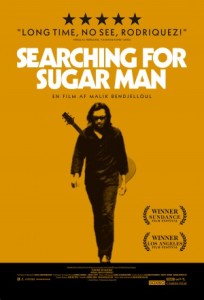Spurning the World’s Riches

The first, Searching for Sugarman, chronicles the story of Sixto Rodriguez.
A singer whose first two albums sold next to nothing, his early 1970s work drew comparisons to Bob Dylan. It also sparked a huge following in the anti-apartheid community in South Africa, even as he toiled in obscurity as a laborer in Detroit.
A years-long search by curious South Africans finally discovered Rodriguez was indeed alive—not the victim of a fiery suicide or other urban legends that sprang up around him.
That led to a series of soul-out concerts in South Africa and continuing appearances around the world. His 2016 U.S. tour with Brian Wilson kicks off next June.
Rags to Riches
I first heard of this unlikely story on NPR. However, until a recent visit to an old friend who purchased the DVD and watches it annually, I didn’t appreciate what a chord Rodriguez’s story struck with people worldwide.
Soon after seeing it, my wife and I watched the DVD of McFarland USA, which a friend in Florida gave a thumbs-up recommendation on her Facebook page. It is another rags-to-riches story about a real-life cross country squad in central California.
In the February 2015 film, Kevin Costner plays a down-on-his luck football coach whose temper costs him a series of jobs. That is, until he forms a cross country team of Hispanic athletes at McFarland High. A few months later, they win the state championship.
A great story, but a rather exaggerated version of the truth. It only took a little online research to discover the vast liberties the filmmakers took.
Yes, Coach Jim White exists, and he did lead McFarland High to nine state championships. But he wasn’t a transplant, never coached football, resumed the sport after a one-year absence (didn’t start it from scratch), and took seven years to win his first state title.
Coach’s Accomplishments
We could argue all day about the justification for 
Still, McFarland USA’s departure from reality shouldn’t obscure White’s accomplishments and the ways in which his optimism helped the people in a small town believe they could achieve great things.
Nor should it obscure the fact that White spurned the opportunity to go to more prominent places and make more money.
Nor did Sixto Rodriguez use his opportunity for fame and riches lure him to forsake his hometown. According to Searching for Sugar Man, he gave away the money derived from his sudden success and continues living in downtown Detroit.
The co-workers interviewed for the documentary give graphic evidence of their disbelief that this ordinary guy could be the object of fame and adulation on the other side of the world.
Common Thread
I see this as the common thread that explains why these two films generate such avid followings. Seeing someone who doesn’t grab for the brass ring when that means turning their back on the people seems almost unbelievable.
“That’s the American dream,” scoffs one cross country runner when White goes to a San Francisco suburb to interview for a coaching opportunity at larger high school.
When White turns down the opportunity to stay at McFarland, it sets off wild cheers. The same kind of cheers that greet Rodriguez when he plays concerts, whether in Amsterdam, Johannesburg or Detroit. People who put others ahead of money and fame really are unusual.


